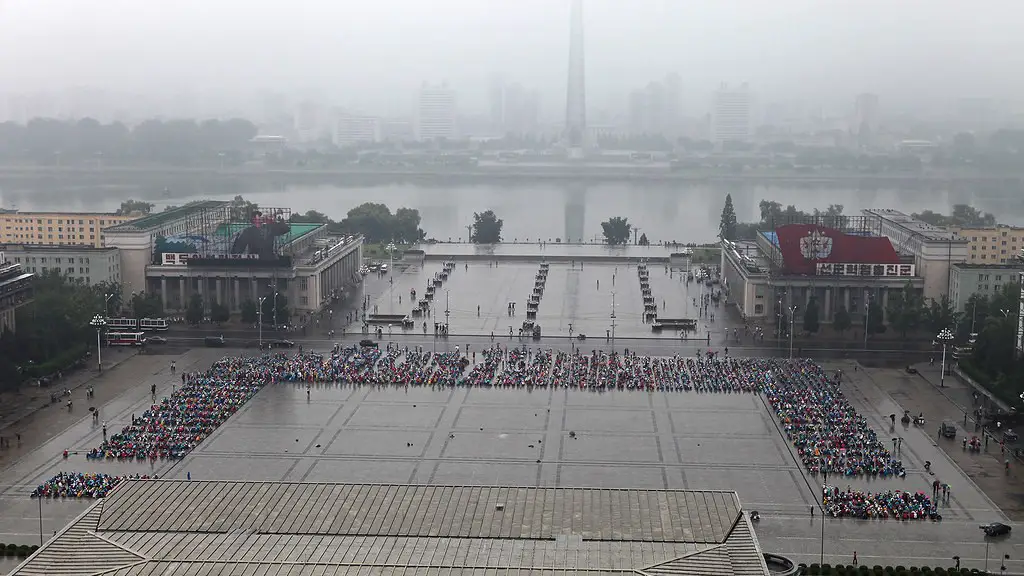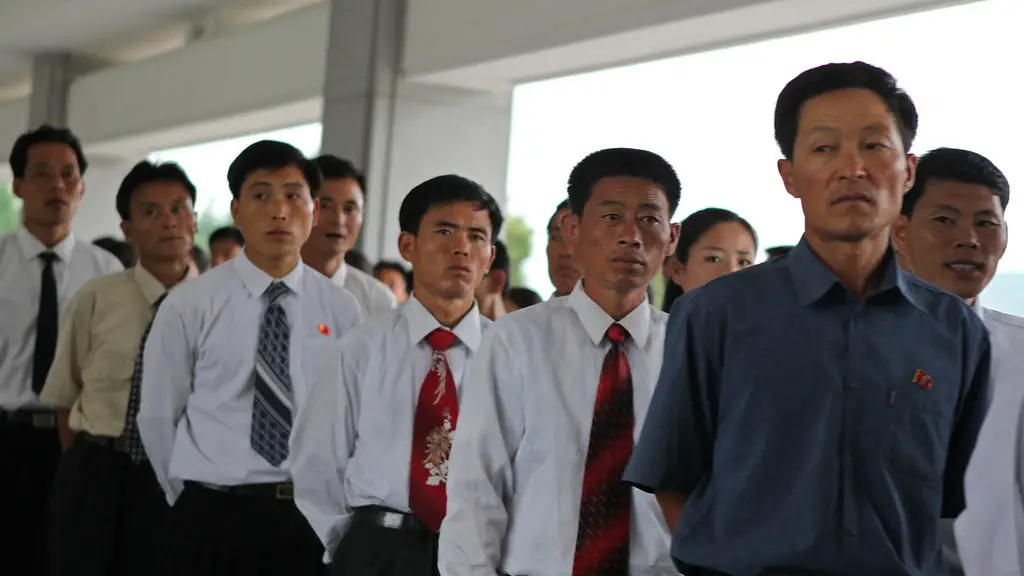The History Behind North Korean Aggression
North Korea’s aggression is rooted in the Korean War that was fought between 1950 to 1953. Now known as the Demilitarized Zone, the Korean peninsula knows the boundary set by the armistice that stopped the war. The US, which was siding with South Korea, is likely responsible for the isolated nature of North Korea. It has become one of the oldest and most volatile conflicts in modern history.
North Korea has suffered many shortfalls and famines in the past 70 years, making it one of the poorest countries in the world. Its economy has seen little progress and there have been reports of malnutrition. North Korea’s leaders have been blamed for continuing to invest heavily in the military and weapons industry.
Political and Military Dangers
The current North Korean leader, Kim Jong Un, is known for his aggressive military strategy, which has resulted in multiple nuclear tests. This has led to the United Nations Security Council condemning North Korea for its efforts to acquire weapons of mass destruction and ballistic missiles. The Security Council can impose economic sanctions on the nation, hoping to force reform.
North Korea is known to possess both nuclear and chemical weapons and continues to be hostile towards other nations. Its military usually responds to foreign threats of intervention with an equal strength threat, including nuclear missiles. This makes it hard for the US to intervene militarily as it could result in a humanitarian disaster too great to be accepted.
Economic Challenges
North Korea continues to be one of the most heavily sanctioned nations in the world, due to its nuclear ambitions, human rights violations and other hostile acts. These sanctions have stifled its already fragile economy, and have caused ramifications throughout the region.
Other nations have increased their own sanctions, such as freezing financial assets, to try and contain North Korea’s nuclear ambitions. North Korea is also on the United States’ list of state sponsors of terrorism, meaning that US companies are prohibited from engaging in business activities with them.
International Response
The United Nations has taken a proactive approach in dealing with North Korea. It has implemented a sanction regime as part of a pressure campaign to force the country to comply, in hopes of deterring their nuclear proliferation.
Other members of the international community have also joined in the effort to bring North Korea up to certain international standards. China holds a great deal of leverage in this matter, as it is North Korea’s main trading partner and the largest provider of aid. China’s position has been to de-escalate tensions and seek dialogue.
Calls for Diplomacy
Many experts have called for diplomatic efforts to be undertaken in order to solve the North Korean crisis. Dialogue and diplomacy have been seen as a more productive and peaceful way to resolve this issue and halt the country’s nuclear ambitions.
The United States and South Korea have worked together to strengthen the alliance between them and protect the region’s peace and stability. In addition, the US has worked with partners in the region, such as China and Japan, to put pressure on North Korea as part of a ‘maximum pressure’ campaign.
What Does the Future Hold?
The future of the North Korean crisis remain uncertain. It has been said that the only way to succeed in containing North Korea’s nuclear ambitions is to engage in a diplomatic process. However, the North Korean regime has refused to negotiate and continues to resist the global community’s pressure.
It is up to global leaders now to come up with creative solutions and dialogue that allow for a peaceful resolution to this decades long conflict.
Alternative Approaches
alternative diplomatic approaches have been put forward as possible solutions to the North Korean situation. Former US President Barack Obama has proposed talks with North Korea and potentially loosening sanctions as rewards for action in the right direction.
The United Nations and other international organizations have joined the call for dialogue and negotiations. There has been a push for nations to work together to shift the dynamics of the region and build trust between the two Koreas.
The Importance of Cultural Exchange
Experts have highlighted the need for cultural exchange between North and South Korea in order to encourage more dialogue. Such exchanges would focus on increasing understanding of each other’s countries, so that citizens of both sides can begin to view each other positively.
This could lead to the possibility of engaging in high-level talks which would allow the two parties to reach a deal which can help ensure peace and security in the region.
Non-Political Solutions
In addition to diplomatic and political approaches, there are also some non-political solutions being put forward. Humanitarian and economic aid for North Korea should be improved, as well as addressing other underlying issues like poverty, malnutrition and discrimination.
This type of reform could be especially beneficial for North Korean citizens, as better standards of living can lead to more stability and diplomatic progress. Additionally, North Korea’s aggressive rhetoric would be much more difficult to get away with if their own people are living in greater comfort.
ASteps Forward
There have been some positive steps forward in controlling the North Korean crisis, including the establishment of the first direct phone line between the two leaders. The phone line could potentially help ease tensions and provide an avenue for dialogue.
Additionally, Pope Francis has recently called for the two Koreas to formally end their war and enter into negotiations. This would be a huge step towards peace and could potentially mark the beginning of a whole new era of relations between the two countries.
The Role of the US
In terms of the US’ role, it is essential to maintain a presence on the Korean peninsula in order to support our allies and ensure peace and stability in the region. The United States must also maintain diplomatic and economic pressure on North Korea in order to persuade them to give up their nuclear weapons.
The US has previously stated that it is open to talks with North Korea and is working with its allies to try and realize this goal. It is hoped that a lasting and peaceful solution can be found through diplomacy and conversation rather than confrontation.


